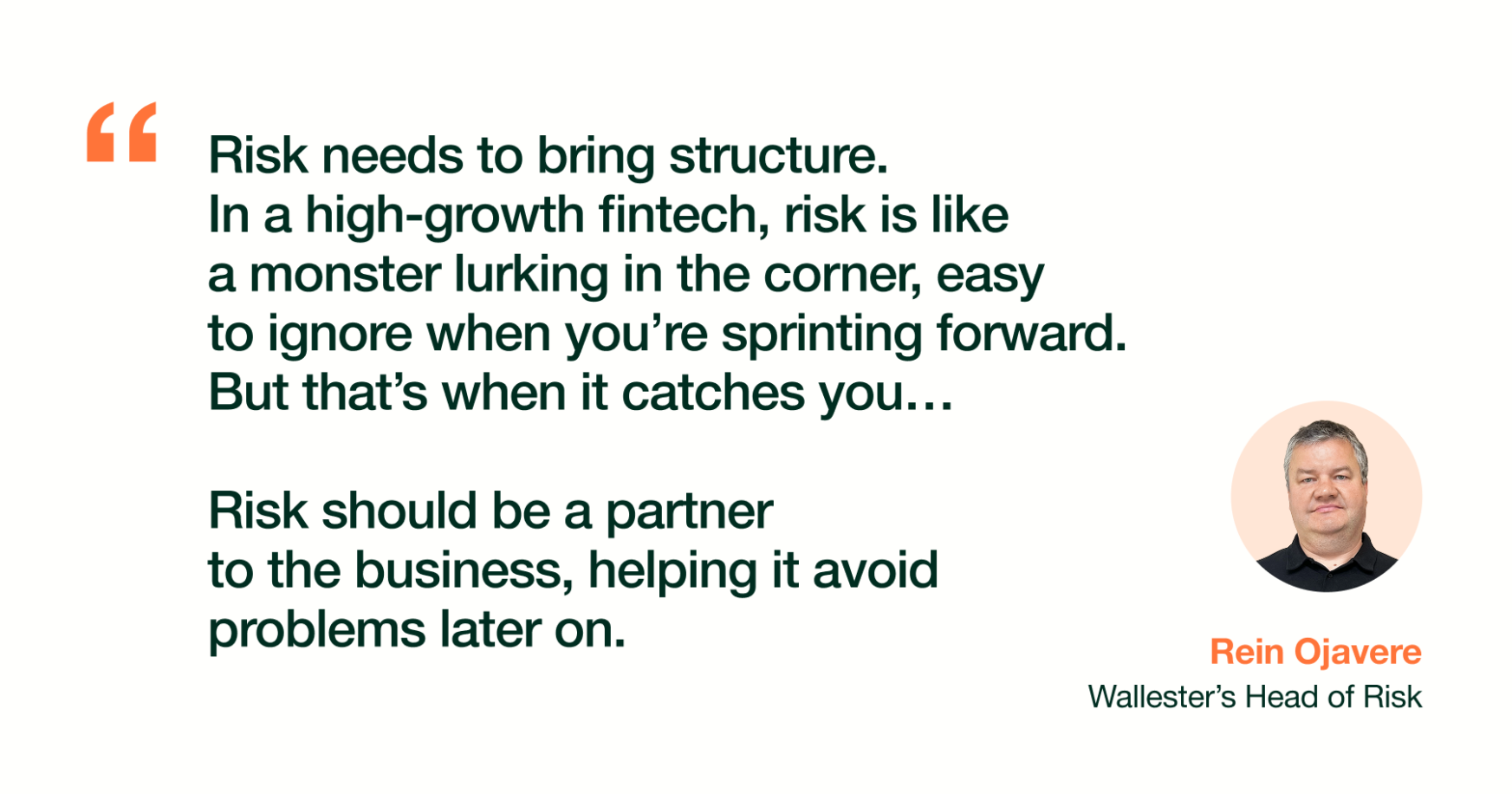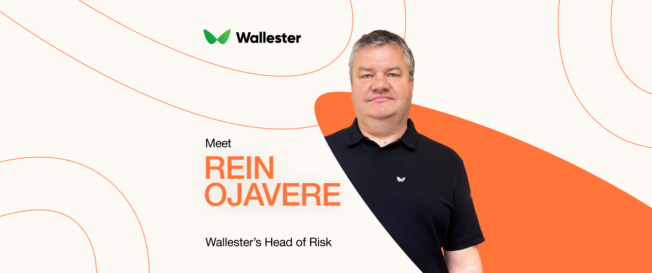With a career spanning investment banking, asset management, and senior leadership roles in fintech, Rein Ojavere brings a uniquely broad and practical perspective to risk management. Now stepping into the role of Head of Risk at Wallester, he’s tasked with helping the fast-scaling payments company navigate regulatory complexity, operational maturity, and the ever-changing landscape of financial crime. We sat down with Rein to hear about his background, philosophy on risk, and what he sees as the key priorities for fintechs aiming to grow without cutting corners.
Interviewer: Rein, you’ve got an impressive background in risk management—your LinkedIn reads like a masterclass in financial services. What are some of the pivotal experiences from your previous roles that have shaped your approach to risk?
Rein Ojavere: I’ve worked across investment banking, asset management, and corporate banking, but I’ve been focused on risk management specifically for the past 10 years. Early in my career, I noticed that the people in risk roles tended to be the more experienced ones, often with a bit more grey hair! That stuck with me.
After years in investment banking, where the pace is brutal and the days can stretch to what feels like 32 hours, I began to see risk as something more strategic. When I became CFO of Bondora, I took on operational risk management responsibilities and led teams focused on different risk areas. Around that time, I also earned my Financial Risk Manager (FRM) certification. It’s not something every risk professional pursues, but for me, it helped connect all the dots. The FRM program gave me a full, structured view of risk, far beyond what you pick up just by reading articles or learning on the job.
Later, I was deeply involved in banking license processes in the Baltics. That meant building everything from the ground up, no legacy systems, no paperwork trails, just a clean slate. It gave me a unique perspective on how all the different elements of risk management tie together in a real, functional system. Not many people get the chance to go through that.
Interviewer: Getting a banking license isn’t exactly a walk in the park, especially in this region.
Rein: Exactly. You could argue there are fewer banking licenses handed out in this region than there are unicorns.
Interviewer: You’ve worked in some serious leadership roles across very different environments. How has that shaped your perspective on risk in fintech, which tends to be more fast-moving?
Rein: In many ways, yes. Fintech is more dynamic and less structured than traditional finance. Banks and asset managers are more risk-averse by default, while fintechs often move fast and break things. The business often runs ahead of risk, or in some cases, startups don’t have a risk function at all, which can prove fatal.
What excites me at Wallester is that there’s already a strong foundation in place. There’s room to improve, but we’re not starting from zero. My belief is that risk management shouldn’t hold the business back; it should support it. It should be embedded in every process, every launch. But in fintech, it also has to move fast. You can’t spend a month drafting documentation. Decisions and implementations need to happen quickly.
Interviewer: So why Wallester? What made this the right next step for you?
Rein: I’ve always worked at an international level, from Scandinavia to Central Asia, so Wallester’s global mindset really appealed to me. It’s a truly international fintech, and I appreciate the multicultural nature of the team and the business.
Also, most of my previous fintech experience hasn’t been in payments, so there’s plenty for me to learn. That’s important to me. And Wallester is also a place where I can put my language skills to use, it’s not just English all the time.
Interviewer: How many languages do you speak?
Rein: Five, English, Estonian, German, Russian, and Finnish.
Interviewer: A polyglot risk manager, love it. You’ve touched on this already, but how do you define the role of risk in a fast-growing fintech?
Rein: Risk needs to bring structure. In a high-growth fintech, risk is like a monster lurking in the corner, easy to ignore when you’re sprinting forward. But that’s when it catches you.
I’m naturally sceptical, which, unfortunately, means I’m often right about things going wrong. That mindset helps in risk roles. At Wallester, we’re not just a tech company; we’re licensed and regulated. So we can’t operate like a five-person startup anymore. We need to move fast, yes, but we also need to do things properly. Risk should be a partner to the business, helping it avoid problems later on.

Interviewer: It’s early days, but what are your top three risk priorities over the next 6 to 12 months?
Rein: We categorise risk broadly, and each has sub-risks, but my main focus right now is operational risk. That covers everything, from business development and legal to marketing. We need to map it, understand it, define mitigation measures, and build a reporting framework.
Then there’s compliance and regulation. These are constantly evolving, and we need to be proactive, not reactive, when changes come. That’s not easy, but it’s crucial.
And of course, financial crime and AML. That’s a permanent focus. The nature of financial crime is always changing, new threats, new methods, so we need to stay one step ahead.
Interviewer: It’s not like you’re fighting the same battle every week. So, how do you stay on top of it all?
Rein: It comes down to the fundamentals: technology, people, and processes. If you manage those properly, structure, planning, and mitigation, you’ll catch most risks before they escalate. And if something looks off, don’t hesitate. Reassess and adjust.
Interviewer: How do you plan to work cross-functionally with teams like Product, Compliance, and Engineering to embed risk awareness across the company? Because let’s be honest, most people don’t think risk applies to them.
Rein: You’d be surprised, there’s already a lot of risk awareness at Wallester. Teams are identifying risks and flagging them. That’s a great start.
But building a real risk culture takes repetition. It needs to be part of every team’s mindset, not just something the “risk guys” worry about. I’ve met with most of the department leads, and they’re supportive. That’s encouraging.
I’ll be in regular contact with teams across the company. Risk needs to be something that unifies us, not just policies and processes, but training, discussions, and shared goals. We’re not a tiny startup anymore; we’re building an institution. That means keeping our agility and innovation while also levelling up our risk maturity.
Interviewer: Are there any specific risk frameworks or methodologies that guide your work?
Rein: There’s always that debate, whether risk management is a science or an art. For me, it’s both. I lean toward the artistic side, I like to create new approaches tailored to each company’s needs. Some things I’ve come up with myself, only to find them later in the literature!
That said, the fundamentals are the same everywhere: policies, assessments, reporting, and mitigation. You start with the standard frameworks, then you adapt them to your business. Risk isn’t one-size-fits-all.
Interviewer: What’s one thing people, even in fintech, tend to misunderstand about risk?
Rein: That it only comes from outside, from technology, markets, AI. People fear the big, abstract threats. But in reality, the biggest risks usually come from within, from people.
We build the systems, we operate them, and we also take shortcuts when things get inconvenient. That’s where the real unpredictability lies. Human behaviour is still the biggest risk factor—and the hardest one to model.
Interviewer: Outside of work, how do you maintain perspective and balance? You’re in a high-pressure leadership role, so what helps you unwind when you’re not at the office?
Rein: I try to keep things simple. I spend a lot of time with my family, and we also have a cat, which is a bit more manageable than a dog.
I also enjoy reading, staying active, and playing some sports. One thing I really enjoy is ice swimming, it’s very refreshing and actually quite energising. You really feel the energy rush afterwards. It’s a kind of reset.
Interviewer: Ice swimming! That’s brave. I’ve done a winter swim followed by a sauna, and even that was intense. Are you picking up any new hobbies or languages?
Rein: Yes, I’ve recently started learning Spanish. I was in South America and Antarctica earlier this year, and that trip really inspired me to give it a go. I’ve tried learning French in the past, but found it very difficult! I have a friend who’s been going to French classes for over ten years, and she’s still going strong. Spanish seems a little more approachable.
Interviewer: That’s great. Anything else you want to mention?
Rein: I’d just say that it’s a really strong team here. I feel like I can bring a lot of my skills and experience into play. It’s an invigorating environment, and I enjoy that.
Interviewer: You mentioned the team, how big is it right now?
Rein: At the moment, it’s just me and Anna Maxim (Group Chief Risk Officer), who’s based in London. But of course, the structure will evolve over time. I collaborate daily with other teams, especially compliance and legal, because building an effective risk framework means working cross-functionally. That’s one of the things I enjoy: I’m not just sitting in one silo. I get to be involved across the business.
I share an office space with the compliance and legal teams, and I don’t feel like I’m on the sidelines at all. If anything, I feel very much integrated. In a larger organisation, you might have risk and compliance split across several layers with different heads, but here it’s more dynamic, and that makes the work more meaningful. Plus, it’s a great group of people. I get along with everyone, which makes a big difference.
Interviewer: Fantastic. Thanks, Rein


